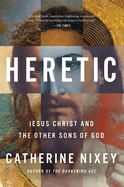
The word "heretic" once meant someone who had made a choice; it "comes from the Greek word haireo, which means 'I choose.' " This definition changed when Christianity came on the scene. Thus begins classicist Catherine Nixey's Heretic: Jesus Christ and the Other Sons of God, an enthralling exploration of early Christianity.
Nixey confronts the common perception that the present form of Christianity is "the Word" as Jesus lived and preached. She paints a picture of a lively religious world around the period identified as the separation between "before Christ" and "in the year of our Lord," which includes numerous accounts of other sons of gods resurrected from death as well as variations on the story of Jesus itself. Drawing on sources that include classical Greek philosophers, fifth- and sixth-century Roman legal codes, medieval theologists, and ancient gospels discovered as recently as 1945 and translated to English in 1996, Nixey demonstrates that the triumph of the current dominant form of Christianity was never inevitable. On the contrary, this form achieved its dominance by denouncing all others as "heresy," turning what was once a positive conceptualization of choice and spirited debate into one seen negatively, as blasphemy.
Nixey's tone is often cynical, matching the classical and medieval philosophers and theologians she cites, but underlying her work is a deep sadness for what might have been and is now lost to violence caused by the surviving form of Christianity's intolerance for people and books expressing divergent beliefs. Atheists and "heretics" will certainly enjoy Nixey's work, while devout Christians may also find fulfillment in learning about the origins of their faith. --Dainy Bernstein, freelance reviewer

